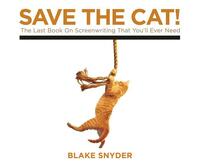Take a photo of a barcode or cover
very american and capitalist but so is the industry so wygd
informative
fast-paced
I will never watch a movie or read a book the same way again. At least not without dissecting every portion of it. This book outlines a template for all things story, which gets the creative juices flowing and helps you craft a tale that is equipped with all of the ups and downs you will ever need. Happy writing to you all.
The tone and humor might be a little dated, even insensitive and problematic at points, but there's no question that Save the Cat by Blake Snyder is a book packed with useful, easily digestible, but comprehensive information. Ostensibly written for screenwriters, I think novelists and short stories writers will find this book equally as beneficial. It might even have a thing or two to teach poets.
"The Blake Snyder Beat Sheet" in chapter 4 damn near brought me to tears in how efficiently and starkly it lays out the beats of a good story. After I read the chapter, I created a beat sheet for my own novel-in-progress, and later the same day, I integrated it with my outline. The story I'm trying to tell is immediately more vivid, visual, and vibrant, and it's filling with incident, emotion, twists and turns. I now see the path forward through some 90,000 words, and with my new logline, beat sheet, outline, and, soon, my own Board (chapter 5 is also tear-inducing), I know I'll be able to keep the momentum going until I reach the end of my novel.
And when I'm ready to revise, there are also fantastic chapters on how to go back to recognize and fix common problems.
A little rough around the edges in terms of tone, Save the Cat is a powerful reference manual to come back to again and again.
"The Blake Snyder Beat Sheet" in chapter 4 damn near brought me to tears in how efficiently and starkly it lays out the beats of a good story. After I read the chapter, I created a beat sheet for my own novel-in-progress, and later the same day, I integrated it with my outline. The story I'm trying to tell is immediately more vivid, visual, and vibrant, and it's filling with incident, emotion, twists and turns. I now see the path forward through some 90,000 words, and with my new logline, beat sheet, outline, and, soon, my own Board (chapter 5 is also tear-inducing), I know I'll be able to keep the momentum going until I reach the end of my novel.
And when I'm ready to revise, there are also fantastic chapters on how to go back to recognize and fix common problems.
A little rough around the edges in terms of tone, Save the Cat is a powerful reference manual to come back to again and again.
informative
lighthearted
medium-paced
This is a solid, albeit dated in more than a few ways, outline and guide on how to write and sell screenplays. I’m not the full demographic (storyteller yes, mainly screenwriter, no), so it didn’t all apply, but still overall interesting with some helpful nuggets.
Honestly titles I especially struggle with, and his breakdown of loglines was great — so I greatly appreciate subjects around focus.
It is a very male-centric read, but nonetheless has wisdom and experienced embedded that would be useful to any aspiring writer.
Honestly titles I especially struggle with, and his breakdown of loglines was great — so I greatly appreciate subjects around focus.
It is a very male-centric read, but nonetheless has wisdom and experienced embedded that would be useful to any aspiring writer.
informative
lighthearted
medium-paced
I hate this guy, it was a struggle getting through this. He has some helpful things to say, but I hate this guy. This is basically a guide to writing movies for people who are in it for the money. A lot of the language is massively patriarchal and at times racist, but if you can suffer through it there are a few interesting things being said.
funny
informative
inspiring
lighthearted
reflective
medium-paced
First of all, I'm not an aspiring screenwriter. I am an aspiring fiction writer. That being said, I thought that this book had a ton of helpful insight on the thing that I often struggle with the most: structure.
He does offer plenty of other tips and tricks, like the title's Save the Cat moment, but I think overall the real value in this book is in the straight foward way that Snyder approaches structure. His narrative voice, while cloying at times, breaks down films (and stories in general) in a way that is simple and relatable. He gives a great blueprint for designing your plot, which might be the most helpful piece in the whole book.
I think that this book is not for those who chafe at self-satisfied narrators, which is pretty evident from the other comments I've read. However, if you can get past Snyder's constant puffy hearts around the two screenplays he's gotten made into movies (Stop or My Mom Will Shoot and Blank Check), there is a wealth of really great information here.
He does offer plenty of other tips and tricks, like the title's Save the Cat moment, but I think overall the real value in this book is in the straight foward way that Snyder approaches structure. His narrative voice, while cloying at times, breaks down films (and stories in general) in a way that is simple and relatable. He gives a great blueprint for designing your plot, which might be the most helpful piece in the whole book.
I think that this book is not for those who chafe at self-satisfied narrators, which is pretty evident from the other comments I've read. However, if you can get past Snyder's constant puffy hearts around the two screenplays he's gotten made into movies (Stop or My Mom Will Shoot and Blank Check), there is a wealth of really great information here.




